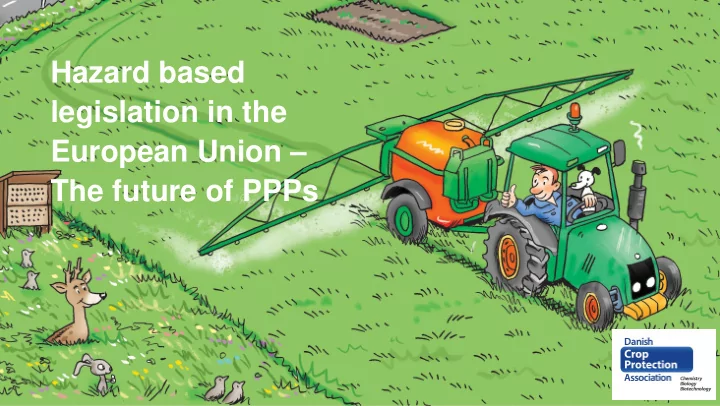

Hazard based legislation in the European Union – The future of PPPs Robert Racz DCPA Chairman / Nordic Baltic Country Manager BASF
Why are we here today? 12.11.2018 | Optionale Zusatzinformationen 2
What systems in the body are we referring to? - Permanent / adverse impact 3 Source: ECPA
Why is this topic of interest to DCPA? Part of 1107/2009 and biopesticides regulations – currently as cut-off criteria According to ECPA, current EU proposal would affect registered products - up to 50 active ingredients could loose their registrations. Study sponsored by ECPA focused on 16 active ingredients and found that: Their use in potatoes, barley, wheat, sugar beet, rapeseed, corn and grapes contributes to 34 - 69 million tons / between € 4.1 - € 8.3bn of crop value Imports of corn, OSR, and sugarbeets increase from 7 to 28 Mt 500,000 jobs in EU at risk of being lost EU wheat export would decrease by half Carbon footprint negatively impacted EU self-sufficency further in doubt 12.11.2018 | Optionale Zusatzinformationen 4
Could these be some questions we should ask ourselves? Should our regulatory system be hazard or risk driven? 1107/2009 is hazard based. Danish tax system on Crop Protection Products is hazard based. Risk assessments are used in registering products 12.11.2018 | Optionale Zusatzinformationen 5
Hazard vs Risk Watching a shark from the beach doesn’t present a risk to your health SWIMMING WITH IT DOES! 12.11.2018 | Optionale Zusatzinformationen 6
Could these be some questions we should ask ourselves? Is there a challenge to define what Endocrine Disrupting Chemicals really are? Endocrine – so many different hormonal systems in the body which are all different Disrupting – is it really permanent? What is the binding strength? Chemicals – syntetic vs natural To what extent do they impact our health? Are the concerns similar to the concerns raised when we discuss the ”Cocktail effect”? What is science driven and what is politically motivated? Who are involved? Toxicologists, medical professionals, environmentalists? What do we want? To feed the world, or worry about what we eat? 12.11.2018 | Optionale Zusatzinformationen 7
Recommend
More recommend